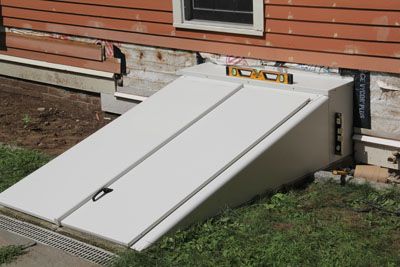Basement Bulkhead: A Complete Guide to Replacement and Costs
Feb 05, 2024
Basement Bulkhead: A Complete Guide to Replacement and Costs
Q: What is a basement bulkhead?
A: A basement bulkhead, also known as a cellar door or hatchway, is an exterior access point to the basement of a home. It typically consists of stairs leading down from ground level and a door that provides entry into the basement.
What is a Basement Bulkhead and Why is it Important?
A basement bulkhead, also known as a cellar door or hatchway, is an exterior access point to your basement. It typically consists of a set of doors or a sloping ramp that leads down from ground level into the basement. These doors are often made of steel, aluminum, or wood and provide both security and weather protection for your basement.
But why are these bulkheads so important? Well, they serve multiple purposes. They act as an alternate entryway into your home’s lower level. This can be particularly useful when you need to move large items such as furniture or appliances in and out of the basement. Without a bulkhead, maneuvering these heavy objects through narrow staircases would be next to impossible.
Additionally, basement bulkheads play a vital role in ventilation and natural light distribution within your basement space. By having a well-functioning bulkhead with proper seals and vents, you allow fresh air to circulate below ground level, preventing musty odors and mold growth.
Factors to Consider Before Replacing a Basement Bulkhead
When it comes to replacing a basement bulkhead, there are several important factors that you should consider. First and foremost, you need to assess the condition of your current bulkhead. Is it structurally sound? Are there any signs of rust or decay? If your bulkhead is in poor condition, replacement may be necessary.
Another factor to consider is the functionality of your current bulkhead. Does it provide easy access to your basement? Is it weatherproof and secure? If not, you may want to explore different door options that offer better insulation and security.
Additionally, think about the style and design of your new bulkhead. Do you want a traditional steel door or something more modern like fiberglass or aluminum? Consider how the new door will complement the overall aesthetic of your home.
Cost is another important consideration. Replacement costs can vary depending on factors such as material choice, size, and installation requirements. It’s essential to get multiple quotes from reputable contractors like Rescon Solutions in order to ensure you’re getting the best value for your money.
Don’t forget about maintenance requirements. Some materials may require more upkeep than others. Think about how much time and effort you’re willing to invest in maintaining your new basement bulkhead.
By carefully considering these factors before replacing your basement bulkhead, you can make an informed decision that meets both your needs and budget while enhancing the functionality and appearance of this crucial entryway into your home’s lower level.
Types of Basement Bulkhead Doors
When it comes to replacing your basement bulkhead, one important factor to consider is the type of door that best suits your needs. There are several types of basement bulkhead doors available on the market, each with its own unique features and benefits.
One common type is the steel bulkhead door. These doors are known for their durability and strength, making them a popular choice among homeowners. They are resistant to weather elements and offer excellent security for your basement.
Another option is the fiberglass bulkhead door. These doors are lightweight yet sturdy, making them easy to open and close. They also provide good insulation properties, helping to keep your basement well-insulated against heat loss or gain.
If you’re looking for a more aesthetically pleasing option, you might consider a wooden bulkhead door. Wood adds a touch of warmth and elegance to any home decor while still providing functionality and protection.
For those seeking maximum convenience, there are even electric-powered bulkhead doors available. These doors can be operated with just the push of a button, saving you time and effort when accessing your basement.
The choice of which type of basement bulkhead door to install depends on factors such as budget, personal preference, climate conditions in your area, and desired level of security or insulation.
Remember to consult with a professional contractor who specializes in basement renovations before making any final decisions regarding which type of basement bulkhead door is best suited for your home’s specific needs!
Cost Breakdown of Basement Bulkhead Replacement
When it comes to replacing your basement bulkhead, it’s important to understand the costs involved. The total cost will depend on various factors such as the size and type of bulkhead, any additional features or upgrades you choose, and the complexity of installation.
You need to consider the cost of purchasing a new basement bulkhead door. Prices can vary depending on the material used (typically steel or aluminum), insulation options, security features, and style preferences. It’s worth noting that while steel doors may be more expensive upfront, they tend to offer better durability and longevity compared to aluminum.
Next, there is the cost of removing and disposing of your old bulkhead door. This typically involves labor fees for professionals who specialize in this type of work. Keep in mind that if your existing bulkhead door is particularly old or deteriorated, there may be additional costs associated with its removal due to potential complications.
Installation expenses should also be considered when budgeting for a basement bulkhead replacement project. Hiring professional contractors ensures proper installation and reduces the risk of future issues. The complexity of installation will impact overall costs – straightforward replacements may require less time and labor compared to installations involving structural modifications or adjustments.
Don’t forget about any permits or inspections required by local building codes during the replacement process. These additional administrative costs are essential for ensuring compliance with safety regulations.
To get an accurate estimate for your specific situation, it’s recommended to consult with multiple contractors who specialize in basement bulkheads. They can assess your unique needs and provide detailed quotes based on materials chosen, labor involved,and other relevant factors specific to your home.
Remember that investing in a quality replacement now can save you money in the long run by reducing maintenance needsand increasing energy efficiency.
Common Issues with Basement Bulkheads and How to Fix Them
Basement bulkheads, also known as cellar doors, provide convenient access to the basement from the exterior of a home. However, like any other part of a house, they can experience common issues that may require attention and maintenance. Here are some of the most frequent problems homeowners face with basement bulkheads and how you can fix them.
1. Rust and corrosion: Over time, metal bulkhead doors can rust due to exposure to moisture and harsh weather conditions. To address this issue, start by removing any loose or flaking paint or rust using a wire brush. Then apply a primer specifically designed for metal surfaces followed by a coat of rust-resistant paint.
2. Leaks and drafts: If you notice water seeping through your basement bulkhead during heavy rain or feel drafts coming in around the door frame, it’s crucial to address these issues promptly. The first step is inspecting the seals around the door for cracks or gaps. Apply weatherstripping or caulking to seal any openings effectively.
3. Sagging doors: With constant use over time, basement bulkhead doors may begin to sag or become misaligned due to wear and tear on hinges and hardware components. This problem can be resolved by tightening loose screws or replacing damaged parts such as hinges or springs.
4. Difficulty opening/closing: If your basement bulkhead door becomes difficult to open or close smoothly, it could be due to debris buildup in the tracks or inadequate lubrication on moving parts such as rollers or hinges. Regularly clean out any dirt from the tracks using a stiff brush and apply lubricating oil where necessary.
By addressing these common issues promptly and performing regular maintenance tasks like cleaning and lubrication, you can keep your basement bulkhead functioning properly for years to come! Remember that if major repairs are needed beyond simple DIY fixes, it’s always best to consult with professionals who specialize in bulkhead repairs for expert guidance and assistance.
Frequently Asked Questions about Basement Bulkheads
Q: Why should I consider replacing my basement bulkhead?
A: There are several reasons why you may need to replace your basement bulkhead. Over time, these structures can deteriorate due to exposure to the elements, resulting in leaks, rust, or structural issues. Replacing your old bulkhead can improve both functionality and aesthetics while providing better protection against water damage and pests.
Q: How do I choose the right type of bulkhead door for my home?
A: When selecting a new bulkhead door, it’s important to consider factors such as material (typically steel or fiberglass), insulation properties, security features, ease of operation (such as hydraulic-assisted doors), and compatibility with your existing foundation and entrance area.
Q: Can I install a new basement bulkhead myself?
A: While some homeowners with DIY experience may be able to handle basic installations, it’s generally recommended to hire professionals for this task. Proper installation requires expertise in assessing foundation conditions and ensuring proper sealing against water intrusion.
Contact Rescon Solutions Today
Replacing a basement bulkhead is an important step in maintaining the structural integrity of your home. It not only provides easy access to your basement but also protects against water damage and improves energy efficiency.
Before embarking on a bulkhead replacement project, it’s essential to consider factors such as material options, door types, and costs. Take the time to research different suppliers and contractors to ensure you’re getting the best quality at a reasonable price.
When selecting a new bulkhead door, choose one that suits your needs in terms of durability, insulation properties, security features, and aesthetic appeal. Consider options like steel doors with weatherstripping or fiberglass doors for better insulation.
As for the cost breakdown of basement bulkhead replacement, keep in mind that prices can vary based on factors like materials used, labor costs in your area, and any additional modifications required during installation. Get multiple quotes from reputable contractors before making a decision.
It’s also crucial to be aware of common issues with basement bulkheads so you can address them promptly. From leaks and rusting hinges to damaged seals or stairs, regular maintenance will help prevent costly repairs down the line.
Replacing a basement bulkhead is an investment worth considering for homeowners looking to enhance their home’s functionality while protecting against potential issues. By understanding what constitutes a good quality bulkhead door and knowing how much it may cost upfront ensures you make informed decisions that align with both your budget and long-term goals.
So take this guide as a starting point on your journey toward replacing your basement bulkhead! Gather quotes from professionals near you who specialize in this type of work. Discuss any concerns or specific requirements you have regarding materials or design preferences before settling on the best option for your home.
Remember that proper installation by experienced contractors is key to ensuring the optimal performance and longevity of your new basement access system. So don’t hesitate – get started today and enjoy the benefits of a secure, efficient, and functional basement bulkhead! Contact Rescon Solutions today for more information.

